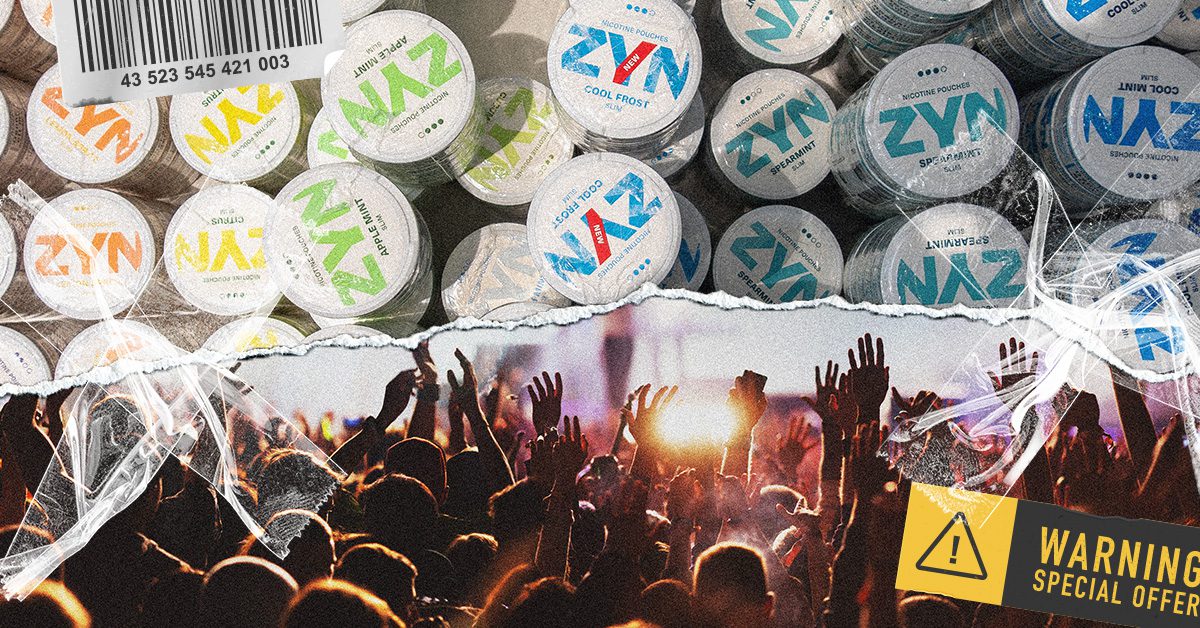In April 2025, Noah Kahan announced an intimate concert in Denver. The tickets sold out in a week. However, they weren’t sold by the venue or through normal concert websites. Instead, you needed to be a member of Zyn’s rewards program and have 3,000 points. How did concert-goers get those points? They had to buy at least 200 tins of Zyn nicotine pouches, roughly $2,000 in addictive and dangerous products.
Just a month earlier, Kahan appeared on Sesame Street in a segment about kindness and emotions. That’s what makes this partnership with a nicotine brand even more troubling.
Zyn is owned by Philip Morris International, one of the world’s largest tobacco companies. This promotion shows a growing trend in nicotine pouch marketing using tactics the tobacco industry has successfully used for decades to addict millions to their products.
What Are Zyn Rewards?
The Zyn Rewards program works through a points system. Customers scan QR codes on Zyn containers to collect points that can be exchanged for various prizes. The program promotes attractive rewards, but people must purchase large amounts of the product to earn enough points for anything significant.1
According to the Truth Initiative, tobacco loyalty programs date back to the 1930s. Raleigh cigarettes included coupons in every pack that could be redeemed for items in a free catalog. Camel Cash, which looked like $1 bills, appeared in Camel cigarette packs starting in 1991. It could be exchanged for items like T-shirts, jackets and bar signs with the Camel logo. This was a way for tobacco companies to advertise through their customers. Many major cigarette brands have operated similar rewards programs.
How Tobacco Companies Use “Rewards” in Dangerous Ways
Programs like Zyn Rewards use something called gamification. When users scan a QR code and watch their points add up on their phone, it triggers a sense of progress and accomplishment — like leveling up in a video game. Those small rewards combined with the addictive nature of nicotine are a dangerous combination.
This isn’t an accident. Rewards programs are designed to make the buying process part of the overall experience. Each scan gives users a small win, encouraging them to keep going. Zyn’s program lets people trade points for hats, coolers, electronics and gift cards, many of which have the Zyn logo printed on them. It’s another way the tobacco industry sneaks advertising into everyday life. However, the math is never in your favor. While the concert may be the flashiest example, earning a $50 gift card might still require spending hundreds of dollars on nicotine pouches.
The real price goes beyond that. There are serious health risks associated with nicotine addiction, including damage to developing brains, heart problems and oral health issues. The appeal of a “prize” hides a lot of truth.
The Dangers of Nicotine Pouches
Just because they don’t contain tobacco doesn’t mean they’re safer. Nicotine use at any age can pose health risks, but this is especially true for young people.2 While nicotine pouches may have fewer ingredients than cigarettes and other smokeless tobacco products, studies have found hazardous substances and possible carcinogens in some nicotine pouches.3 The high levels of nicotine, whether synthetic or tobacco derived, also pose a serious threat.
- Nicotine is addictive. Youth who use nicotine at a young age are at a higher risk of developing a nicotine addiction later in life.4
- Nicotine disrupts brain development and affects mental health.
- Nicotine affects the body. It can disrupt the heart and causes many oral health complications, including cavities, gum recession and lesions that could become cancerous.
Nicotine pouches come in a variety of youth-targeted flavors, including fruit and mint. The availability of these appealing flavors is particularly troubling. According to the 2024 National Youth Tobacco Survey, more than eight out of 10 current youth nicotine pouch users use flavored options.5 Flavors intentionally play a powerful role in attracting young people.
What Needs To Change
The Noah Kahan concert promotion shows how far these companies will go to build brand loyalty. Marketing strategies that require thousands of dollars in nicotine purchases to access exclusive events aren’t customer appreciation; they’re deceptive marketing tactics.
As youth usage rates climb and nicotine concentrations in pouches increase, more work is needed to prevent a new generation of Oklahomans from Big Tobacco. The real reward isn’t concert tickets; it’s protecting Oklahoma’s future from addiction.
Learn how you can make an impact against the tobacco industry. Visit our Get Involved page.
Sources
- Truth Initiative – Zyn Rewards Programs Follows Big Tobacco’s Marketing Playbook
- Truth Initiative – What Is Zyn and What Are Oral Nicotine Pouches?
- MD Anderson Cancer Center – What To Know About Nicotine Pouches
- Centers for Disease Control and Prevention – Youth and Tobacco Use
- U.S. Food and Drug Administration – Results from the Annual National Youth Tobacco Survey
